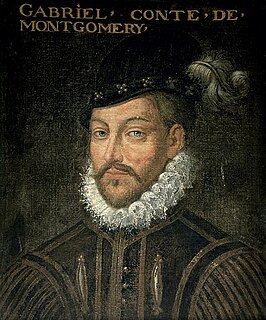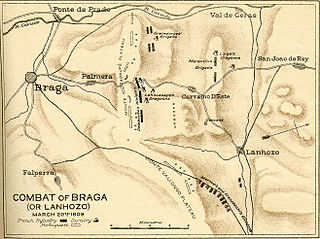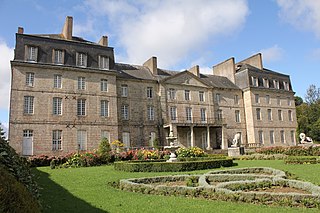
Year 1554 (MDLIV) was a common year starting on Monday of the Julian calendar.

1630 (MDCXXX) was a common year starting on Tuesday of the Gregorian calendar and a common year starting on Friday of the Julian calendar, the 1630th year of the Common Era (CE) and Anno Domini (AD) designations, the 630th year of the 2nd millennium, the 30th year of the 17th century, and the 1st year of the 1630s decade. As of the start of 1630, the Gregorian calendar was 10 days ahead of the Julian calendar, which remained in localized use until 1923.

Year 1533 (MDXXXIII) was a common year starting on Wednesday of the Julian calendar.

The Second Battle of Zurich was a key victory by the Republican French army in Switzerland led by André Masséna over an Austrian and Russian force commanded by Alexander Korsakov near Zürich. It broke the stalemate that had resulted from the First Battle of Zurich three months earlier and led to the withdrawal of Russia from the Second Coalition. Most of the fighting took place on both banks of the river Limmat up to the gates of Zürich, and within the city itself.

Gabriel de Lorges, Count of Montgomery, Lord of Lorges and Ducey, was a French nobleman of Scottish extraction and captain of the Scots Guard of King Henry II of France. He is remembered for mortally injuring Henry II in a jousting accident and subsequently converting to Protestantism, the faith that the Scots Guard sought to suppress. He became a leader of the Huguenots. In French-language contexts, his name is spelled Montgommery.

The Order of the Sacred Treasure is a Japanese order, established on 4 January 1888 by Emperor Meiji as the Order of Meiji. Originally awarded in eight classes, since 2003 it has been awarded in six classes, the lowest two medals being abolished that year. The most widely conferred Japanese order, it is awarded to those who have made distinguished achievements in research fields, business industries, healthcare, social work, state/local government fields or the improvement of life for handicapped/impaired persons.

The Attorney-General for Ireland was an Irish and then United Kingdom government office-holder. He was senior in rank to the Solicitor-General for Ireland: both advised the Crown on Irish legal matters. With the establishment of the Irish Free State in 1922, the duties of the Attorney General and Solicitor for Ireland were taken over by the Attorney General of Ireland. The office of Solicitor General for Ireland was abolished at the same time, for reasons of economy. This led to repeated complaints from the first Attorney General of Ireland, Hugh Kennedy, about the "immense volume of work" which he was now forced to deal with single-handed.
Durfort is the name of a French noble family, distinguished in French and English history. It originated as feudal lords of Durfort, Tarn, a village of south-western France.

The Battle of Gembloux took place at Gembloux, near Namur, Low Countries, between the Spanish forces led by Don John of Austria, Governor-General of the Spanish Netherlands, and a rebel army composed of Dutch, Flemish, English, Scottish, German, French, and Walloon soldiers under Antoine de Goignies, during the Eighty Years' War and the Anglo-Spanish War (1585–1604). On 31 January 1578 the Spanish cavalry commanded by John's nephew, Don Alexander Farnese, Prince of Parma, after pushing back the Netherlandish cavalry, attacked the Netherlandish army, causing an enormous panic amongst the rebel troops. The result was a crushing victory for the Spanish forces. The battle hastened the disintegration of the unity of the rebel provinces, and meant the end of the Union of Brussels.

The 2006 United States Senate election in Wisconsin was held November 7, 2006. Incumbent Democratic U.S. Senator Herb Kohl won re-election to his fourth and final term in a landslide.

Guy Aldonce de Durfort, duc de Lorges, Marshal of France, (1630–1702) fought in the Franco-Dutch War mostly on the Rhine under his uncle Marshal Turenne, but in 1673 he was seconded to the Siege of Maastricht. Back on the Rhine he fought at Entzheim in 1674, at Turckheim in January 1675, and at Sasbach in July 1675, where Turenne fell. He distinguished himself at the retreat from Sasbach and the ensuing Battle of Altenheim.

The Life Guards was the senior formation of the King of France's Household Cavalry within the Maison militaire du roi de France.

The 2000 United States Senate election in Wisconsin took place on November 7, 2000. Incumbent Democratic U.S. Senator Herb Kohl won re-election to a third term by a margin of 24.5%.

Arna, commonly styled as ARNA, is an annual literary journal published by the University of Sydney Arts Students Society. Originally named The Arts Journal of the University of Sydney, it was published regularly between 1918 and 1974 under the auspices of the Faculty of Arts and in 1938 the journal was renamed The ARNA: The Journal of the Arts Society. Publishing of the journal ceased unexpectedly in 1974.

The Battle of Braga or Battle of Póvoa de Lanhoso or Battle of Carvalho d'Este saw an Imperial French corps led by Marshal Nicolas Soult attack a Portuguese army commanded by Baron Christian Adolph Friedrich von Eben. When Soult's professional soldiers attacked, the Portuguese at first fought back but soon ran away. The French slaughtered large numbers of their opponents, who were mostly badly disciplined and poorly armed militia. The action was part of the second invasion of Portugal, during the Peninsular War.

The Jin–Song Wars were a series of armed conflicts conducted by the Jurchen-led Jin dynasty and the Song dynasty in the 12th and 13th centuries. The Jurchens were a Tungusic–speaking tribal confederation native to Manchuria. They overthrew the Khitan-led Liao dynasty in 1122 and declared the establishment of a new dynasty, the Jin. Diplomatic relations between the Jin and Song deteriorated, and the Jurchens first declared war on the Song dynasty in November 1125.
The III Cavalry Corps of the Grande Armée was a French military unit that existed during the Napoleonic Wars. The corps was created in 1812 and reconstituted in 1813 and 1815. Emperor Napoleon Bonaparte first mobilized the corps for the invasion of Russia. Commanded by General Emmanuel de Grouchy, two divisions of the corps fought at Borodino, Tarutino, and Vyazma. A third division fought at the First and Second battles of Polotsk and the Berezina. During the War of the Sixth Coalition in 1813, General Jean-Toussaint Arrighi de Casanova led the corps at Großbeeren, Dennewitz, Leipzig, and Hanau.
The IV Cavalry Corps of the Grande Armée was a French military unit that existed during the Napoleonic Wars. The corps was created in 1812 and rebuilt in 1813 and 1815. Emperor Napoleon I first organized the corps for the invasion of Russia. Under General Victor de Fay de La Tour-Maubourg, the corps fought at Borodino. During the War of the Sixth Coalition in 1813, General François Étienne de Kellermann commanded the all-Polish corps at Leipzig.

Plœuc-l'Hermitage is a commune in the Côtes-d'Armor department of western France. The municipality was established on 1 January 2016 and consists of the former communes of Plœuc-sur-Lié and L'Hermitage-Lorge.

The Battle of Altenheim took place on 1 August 1675 during the 1672-1678 Franco-Dutch War near Altenheim, in modern Baden-Württemberg. It was fought by a French army of 20,000, jointly commanded by the Marquis de Vaubrun and the Comte de Lorges, and an Imperial Army of 30,000 under Raimondo Montecuccoli.















